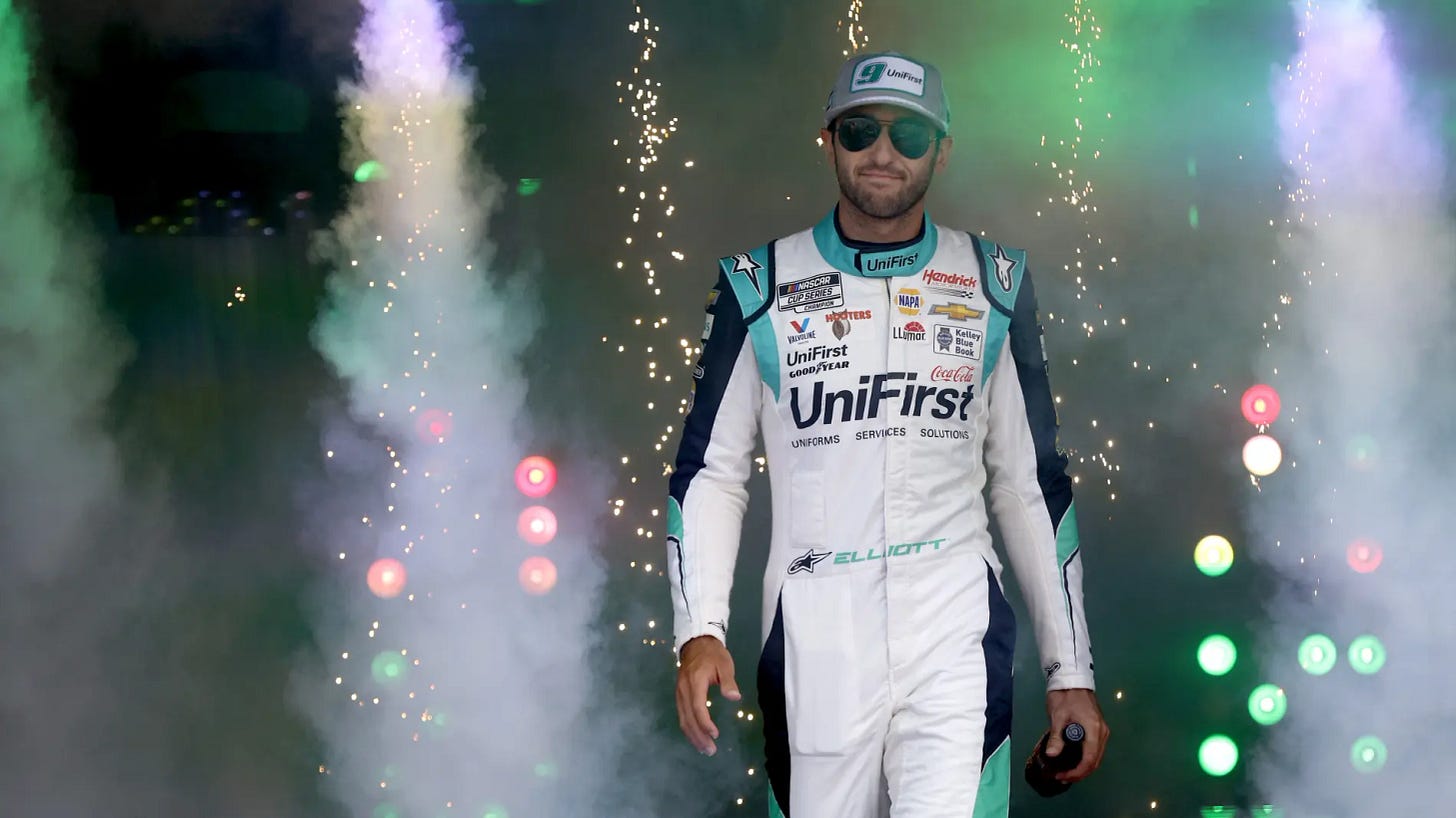How Chase Elliott Can Still Make the NASCAR Playoffs
NASCAR’s biggest star is currently on the outside of the championship hunt — but he has options to make it in.
Few sports love their biggest stars quite the same way NASCAR does. Just look at the annual award for the Most Popular Driver: Going back many decades, it has belonged to just a handful of different names — most of whom monopolized the honor thanks to a rabid band of followers who voted for their beloved favorite unconditionally.
So when NASCAR’s current No. 1 star — Chase Elliott — finds himself on the playoff chopping block, it qualifies as a crisis not just for the driver and his team, but also for the sport itself. With four races to go before the cutoff for the Cup Series’ 16-driver postseason field, Elliott currently ranks 20th in the standings, 40 points out of the last playoff spot.
But fear not, Elliott fans and anxious, TV ratings-minded NASCAR executives: The sport’s most popular driver is still more likely to claw his way into the playoffs than not.
One way he might do that is to simply run down the drivers ahead of him in points. Elliott is traditionally a model of consistency when it comes to driving fast and finishing races strong: Among active drivers, only the great Kevin Harvick (12.7) has a better career average finish than Elliott (13.0). When he hasn’t been busy breaking his leg in a snowboarding accident, getting suspended for an on-track incident and missing seven races overall, Elliott ranks seventh among full-time drivers in points per race this season. That’s a far better pace than any of the names between him and the postseason cutoff have driven at.
As fellow driver (and sometime adversary) Denny Hamlin pointed out on his podcast this week, it’s not inconceivable that Elliott builds enough momentum in the standings over the next four weeks to leapfrog his playoff-bubble rivals. However, his current pace is not quite good enough to get that job done. If every driver in the postseason hunt continues piling up points at their per-race average from this season, Elliott would finish the regular season in 17th place, 10 points shy of Michael McDowell for the 16th and final playoff spot.
To make up the gap from his current point total to where McDowell projects to finish the regular season in points, Elliott would have to score 31.4 points per remaining race — maintaining an average finish of approximately 9.8 (after accounting for stage bonuses), compared with the 11.8 average finish he’s produced so far this season.
So in other words, Elliott needs to really step things up if he’s going to make the playoffs on points alone. And that’s without even considering the possibility that, because NASCAR’s playoff system gives automatic berths to race winners, a new winner from the group below Elliott in the standings would shift the point cutline upward, further increasing the degree of difficulty for that postseason path.
But NASCAR’s famously arcane playoff format can work to Elliott’s advantage, too.
Because one win is all it takes to punch a ticket to the playoffs, his most straightforward path probably just involves a checkered flag at one of the next four races. And as luck would have it, Elliott is going to get a few extremely good opportunities to do just that. While this weekend’s race will be at Michigan, a classic oval track the likes of which Elliott has won at 3.5% of the time, each of the following two races will be at road courses — the Indianapolis Grand Prix circuit and then Watkins Glen International — before NASCAR closes out the regular season at the superspeedway in Daytona.
Elliott happens to be one of the best road-course drivers in NASCAR history, with the most wins (seven) and best average finish (8.0) of any active driver at circuits where you have to turn right in addition to turning left. His career winning percentage on road courses is 26.9%, third-best of anyone with at least 10 career races at those tracks since 1972. (Only Tim Richmond, at 31.3%, and David Pearson, at 27.3%, are higher.) Elliott’s mastery of road courses is his secret weapon for making the playoffs.
If we plug in his career winning percentages at each track type — road course, oval/speedway, superspeedway, dirt track, etc. — and use those to calculate his odds of winning at least one of the next four races, Elliott is still slightly more likely to make the playoffs via victory lane (51.9%) than to miss out.
And if that does happen, it would totally change the tale of the 2023 season for Elliott. To this point, his story has been one of disappointment, injury and some surprisingly immature decision-making — both when he put himself in a position to have that snowboarding accident and in the intentional wreck of Hamlin that drew a one-race suspension. Though still wildly popular, Elliott didn’t follow up his 2020 Cup Series championship with similarly dominant driving in subsequent years; if anything, his performance has tailed off as he enters his late 20s. A lost season without a playoff berth — potentially the first of his career in a full slate of races — would simply add to the narrative that this precocious, second-generation phenom has stalled out and underachieved. But a playoff-clinching win would flip that account on its head, and give Elliott the chance to reward his legion of fans with another title.
Filed under: NASCAR








